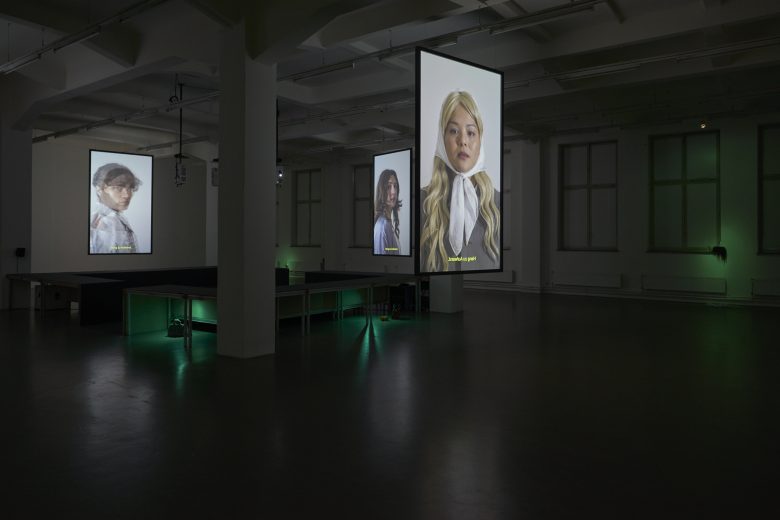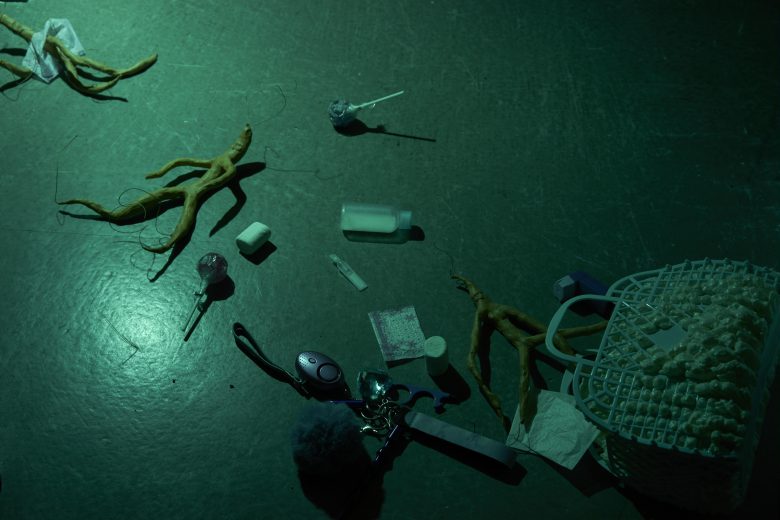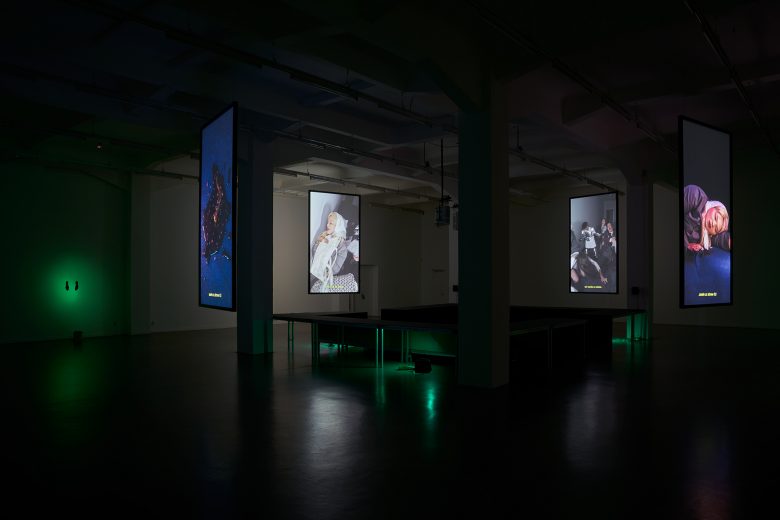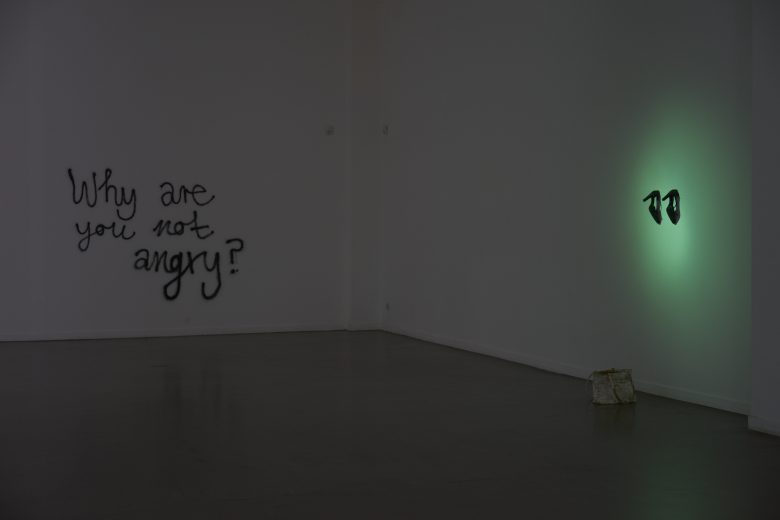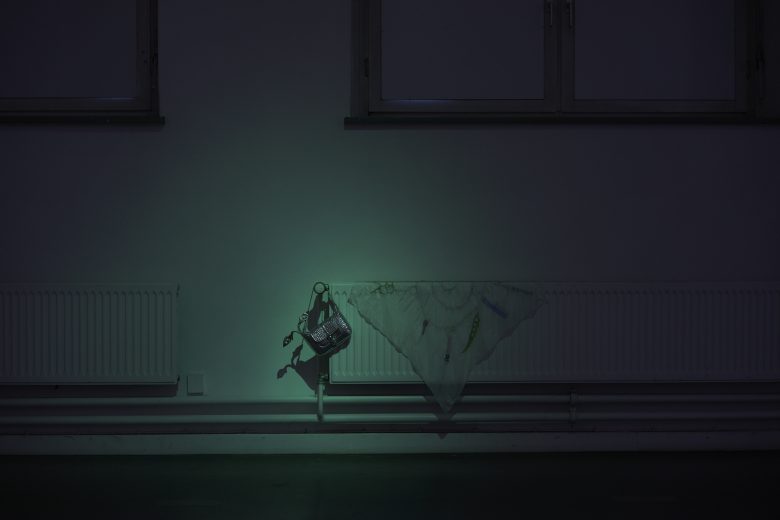Rosanna Graf, Ordinary Women – Carrier Bags of Friction, 2023, Installation view Kunsthaus Hamburg 2023, © VG Bild-Kunst Bonn, 2023, Photos: Antje Sauer
Rosanna Graf
Ordinary Women – Carrier Bags of Friction
11 November 2023 – 7 January 2024
Kunsthaus Hamburg
The enigmatic worlds that Rosanna Graf (*1988 in Munich) creates in her works always hold the potential to cause a sense of unease. In her artistic work, she explores collective fantasies and combines old and new myths into speculative fictions. Feminist, non-human and grotesque characters take centre stage as projection figures. In a surreal state of limbo detached from space and time, these marginalized figures fight against being stereotyped. For the exhibition space of the Kunsthaus, the artist produced a large-scale 4-channel video installation entitled Ordinary Women – Carrier Bags of Friction. Female rage is the key element underlying this new body of work which, based on numerous references to film, literature and media, succeeds in deconstructing long-established role models.
Right from the start, fragmentary scenes evoke associations with the horror film genre and fantasy literature: four women are lured by a fifth into an undefined space reminiscent of the classic haunted house. Together they embark on an exploratory journey through this liminal place. Along the way, given social rules and norms gradually cease to apply. Many of the protagonists are inspired by women who caused a great stir in the media during the 1970s and beyond. Infamous figures such as RAF terrorist Susanne Albrecht, German-Bolivian guerrilla fighter Monika Ertl or actress Ingrid van Bergen had shocked the public with revenge, murder and resistance. References to these role models can be discerned in the characters’ costumes and lyrics. One of them recites from the SCUM Manifesto by the American radical feminist Valerie Jean Solanas, who seriously injured Andy Warhol with a gunshot a few months after its publication. Another is seen proclaiming her visions, similar to the martyr and French national heroine Jeanne d’Arc. In terms of spiritual guidance, the group is led by a witch played by Rosanna Graf herself. However, her pledge to cleanse the women of their uncontrolled emotions is not fulfilled. Through deliberate provocation, the anti-heroines’ anger escalates – while their gaze inevitably falls back on us.
While there still exists the cliché of the furious, unaccountable or hysterical woman, in men, anger is not seen as a taboo but rather as a sense of morality. In response to this paradox, Rosanna Graf turns female rage into a transformative force. Defying media authorities, female-connoted clichés and outdated attributions, she affirms a self-determined femininity. By reverting to the symbolic figure of the witch, the artist addresses the centuries-old stigmatization of independent women and draws parallels to the present day. Since the Middle Ages and even to this day, people who are thought to have magical powers have been denounced, persecuted and murdered. Rosanna Graf counteracts the male-dominated, mechanistic world view from which this discrimination derives with spiritual motifs such as the mandrake. Countless stories revolve around this medicinal plant, which according to myths possesses magical roots. With its deafening scream, it becomes a symbol of self-empowerment in the video.
The title of the exhibition, in turn, playfully alludes to the feminist history of technology conceived by visionary science fiction author Ursula K. Le Guin. In her 1986 essay The Carrier Bag Theory of Fiction, she places women collectors’ carrier bags used to provide a livelihood for the community at the centre of the narrative, thus undermining the linear mode of heroic storytelling. What if humanity’s primary inventions were not phallic hunting and combat weapons, but carrier bags – simple containers such as the basket of wild oats or a medicine bundle? In reference to this proposition, the clichéd handbags of “ordinary women” in the video become symbols of repressed potential. What happens when we completely give in to our anger? Which boundaries can be crossed, which systems shaken if we collectively raise our voices? It is, after all, narratives that determine how we look at and interpret the world.
Cast: Ella Fleck – The Actress, Rosanna Graf – The Antagonist, Sophia Kennedy – The Journalist, Cristina Negucioiu – The Saint, Paulina Nolte – Girl, Jasmin Truong – Incognito
Camera: Levente Pavelka, Goscha Steinhauer, Music: Sophia Kennedy, Costume: Leonie Falke, Audio mixdown: Nikolaus Graf, Assistance: Laurens Maria Bauer, Laura Franzmann, Scenography: Jakob Engel, Rosanna Graf, Thanks to: Studio Mondial, Konrad Baumann
Rosanna Graf (*1988, Munich) studied Fine Arts at HFBK Hamburg and Goldsmiths, University of London. Selected exhibitions of her work include Kunstraum Kreuzberg, Berlin (2020); Deichtorhallen Hamburg / Sammlung Falckenberg (2019); Kunsthaus Hamburg (2019); annual editions of Kunstverein Munich (2017) and Galerie Conradi, Hamburg (2016). She is part of the performance collective DOLLHOUSES.
Opening
Friday, 10 November 2023, 7 pm
Introduction Anna Nowak (Kunsthaus Hamburg)
From 9 pm: DJ-Set by Internet Offline
Guided tours
Thursday, 16 November 2023, 5 pm
Saturday, 9 December 2023, 5 pm
Wednesday, 3 January 2024, 6 pm
Accompanying programme
Friday, 15 December 2023, 6 pm
Artist talk with Rosanna Graf, Sophia Kennedy & Anna Nowak
Saturday, 16 December 2023, 11:00 am-12:30 pm
Workshop for children (8-13 years), 5€
Registration: register@kunsthaushamburg.de
Sunday, 7 January 2024, 4 pm
Finissage & Reading with Rosanna Graf, Jara Bihler and Philipp Joy Reinhardt
Kindly supported by

